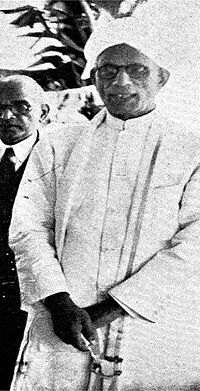|
T. R. Venkatarama Sastri
Thiruvalangadu Raju Venkatarama Sastri CIE (6 February 1874 – 2 July 1953) was an Indian lawyer and politician who served as the Advocate-General for Madras Presidency from 1924 to 1928. He was also known as T.R.V.Sastri.[1] Early lifeVenkatarama Sastri was born on 6 February 1874 in Mayavaram (now known as Mayiladuthurai).[2][3] His father, Thiruvalangadu Raju Sastri was a Sanskrit scholar.[4] Venkatarama Sastri studied at the Municipal High School at Mayavaram, graduated from the Government College at Kumbakonam in 1894, received his B.L degree from the Law College at Madras in 1898 and enrolled in the Madras Court in April 1899 working initially as an apprentice under Sir P.S. Sivaswamy Aiyar.[4] CareerOn completion of his studies, Sastri enrolled as a lawyer in 1899[5] and rose to become the Advocate-General of Madras Presidency in 1924 succeeding Sir C. P. Ramaswami Iyer. Venkatarama Sastri was also the President of the National Liberal Federation of India which in 1945 suggested the formation of a central government represented by all major political parties of India with provisions for minority representation.[6] T.R. Venkatarama Sastri also drafted the RSS constitution, helped lift the ban on Rashtriya Swayamsevak Sangh (RSS) and facilitated the release of M.S.Golwalker.[7][8] He was a RSS sympathiser and a personal friend of Golwalkar.[9] LifeAfter his tenure as the Advocate-General of Madras Presidency, he served as the Law Member in the Government of Madras,[1] having been promoted to that position by George Goschen who did not want to offend Brahmins by excluding them from the cabinet.[10] Additionally, Sastri also served as a Member of the Hindu Law Committee, Government of India.[11] In his long and illustrious career, Venkatarama Sastri served as a member of several committees, such as the Bajpai Commission on Ceylon Refugees, and B.N.Rau Committee on Hindu Code Reform.[12] Venkatarama Shastri made his home in the Edward Eliots Road, Chennai where he stayed until his demise. A robbery at his home was once reported to the police of which E. N. Purushothaman reminisces in his book "The Police I Served":
Death and legacyVenkatarama Sastri died on 2 July 1953.[3] On his death, the then Chief Minister of Madras state, C. Rajagopalachari said:
He had a namesake R K Venkatarama Shastri (1907-1993) who was an ace violinist, and the main accompanist for M S Subbulakshmi during the 1950s. Notes
References
|
||||||||||||||||||||||||||||||
Portal di Ensiklopedia Dunia
